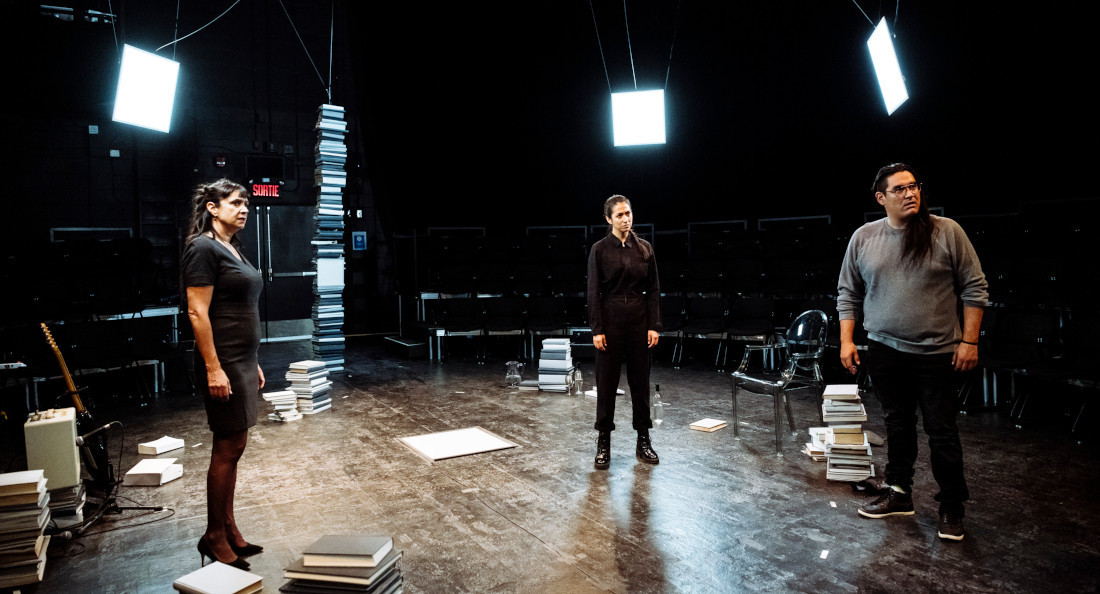Dread who’s coming to dinner
alterNatives serves belly laughs, social commentary in equal portions
Dinner parties can be a social minefield on a good evening. A festive atmosphere combined with expected decorum and free-flowing wine can be a recipe for disaster – which makes it all the more relieving, and amusing, when one can step back and simply watch it unfold.
alterNatives, a play by Canadian Drew Hayden Taylor, focuses on a divisive dinner party, hosted by an odd couple pairing and culminating in a healthy dose of contention served with the entrées. The show is celebrating its 25th anniversary this year and runs until Jan. 20 at Théâtre Cercle Molière (TCM).
“We have Angel, a younger Indigenous sci-fi writer, who is in a relationship with Corinne, an older Jewish university professor who teaches Indigenous lit at the university,” Charles Bender says. Bender is the co-artistic director of Menuentakuan, the show’s Montréal-based partner production company.
“Corinne invites two of her friends over for dinner, Dave and Michelle, both of whom are vegan. But she also surprises Angel by inviting two of his old friends, the titular alterNatives. They’re Indigenous militants, very cheeky and love to stir up trouble.”
Hysteria and hilarity ensue. Focusing on the clash of cultures and best intentions gone awry, alterNatives is touted as both a comedy and an enlightening experience.
“It’s a satiric comedy. It talks about our relationship and links between Indigenous and non-Indigenous people,” director Xavier Huard says.
“It’s a play about allyship and how allies with their best intentions can sometimes aim not quite in the right direction,” Bender says.
“In going too far with things, they create more chaos than actually creating more opportunities for relationships.”
He credits TCM artistic and executive director Geneviève Pelletier with the convergence of the theatre companies.
“She is really keen on bringing in Indigenous companies from all across Canada, making sure there are as many possibilities at the theatre she directs as possible,” Bender says.
Huard cites the political climate in Québec and enduring relevance of Taylor’s drama as reasons for this particular adaptation.
“I first read it in 2018. At the time, these sorts of questions were circulating in the media in Montréal and Québec. There was a new wave of sympathy for Indigenous artists and Indigenous art,” he says.
Taking a more collaborative approach to their projects, the Menuentakuan crew emphasized the collective in this comedy about division and allyship.
“We don’t work from the traditional mode of theatre, where the director is like a god and makes all the decisions,” Huard says.
“That’s not really in our spirit. In my work with them, I try to feed them my comprehension and my point of view of the show. We choose collectively what’s our end goal with the show.”
While Bender says relations between Indigenous and non-Indigenous people are often defined by conflict and tragedy, he aspires to handle the subject with levity. Both artists are quick to note that, above all else, alterNatives is a farce.
“It’s a Friends episode. We poke fun at everything. It’s a very fun romp,” Bender says.
“We often think comedy is easier than tragedy, but I think it’s the contrary,” Huard says.
“It’s the genius of theatre to treat this subject in a way we can laugh at it. You can enjoy it and laugh and explore questions we often fear.”
alterNatives runs until Jan. 20 at Théatre Cercle Molière (340 Provencher Blvd). For tickets and information, visit cerclemoliere.com.
Published in Volume 78, Number 14 of The Uniter (January 18, 2024)








